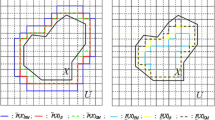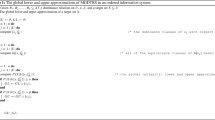Abstract
Presently, the notion of multigranulation has been brought to our attention. In this paper, the multigranulation technique is introduced into incomplete information systems. Both tolerance relations and maximal consistent blocks are used to construct multigranulation rough sets. Not only are the basic properties about these models studied, but also the relationships between different multigranulation rough sets are explored. It is shown that by using maximal consistent blocks, the greater lower approximation and the same upper approximation as from tolerance relations can be obtained. Such a result is consistent with that of a single-granulation framework.
Access this article
We’re sorry, something doesn't seem to be working properly.
Please try refreshing the page. If that doesn't work, please contact support so we can address the problem.
Similar content being viewed by others
References
Pawlak Z. Rough Sets-Theoretical Aspects of Reasoning About Data. Kluwer Academic Publishers, 1992
Gore A. Earth in the Balance. New York: Plume Books, 1992
Ebenbach D H, Moore C F. Incomplete information, inferences, and individual differences: the case of environmental judgments. Organizational Behavior and Human Decision Processes, 2000, 81: 1–27
Yang X B, Yang J Y. Incomplete information system and rough set theory: models and attribute reductions. Science Press & Springer, 2012
Yang X B, Zhang M. Dominance-based fuzzy rough approach to an interval-valued decision system. Frontiers of Computer Science in China, 2011, 5: 195–204
Alonso S, Chiclana F, Herrera F, Herrera-Viedma, Alcalá-Fdez, Porcel C. A consistency based procedure to estimate missing pairwise preference values. International Journal of Intelligent Systems, 2008, 23: 155–175
Herrera-Viedma E, Chiclana F, Herrera F, et al. Group decision-making model with incomplete fuzzy preference relations based on additive consistency. IEEE Transactions on Systems, Man, and Cybernetics Part B, 2007, 37: 176–189
Kryszkiewicz M. Rough set approach to incomplete information systems. Information Sciences, 1998, 112: 39–49
Leung Y, Li D Y. Maximal consistent block technique for rule acquisition in incomplete information systems. Information Sciences, 2003, 115: 85–106
Leung Y, Wu W Z, Zhang W X. Knowledge acquisition in incomplete information systems: A rough set approach. European Journal of Operational Research, 2006, 168: 164–180
Shao M W, Zhang W X. Dominance relation and rules in an incomplete ordered information system. International Journal of Intelligent Systems, 2005, 20: 13–27
Yang X B, Yang J Y, Wu C, Yu D J. Dominance-based rough set approach and knowledge reductions in incomplete ordered information system. Information Sciences, 2008, 178: 1219–1234
Stefanowski J, Tsoukias A. Incomplete information tables and rough classification. Computational Intelligence, 2001, 17: 545–566
Qian Y H, Liang J Y. Rough set method based on multi-granulations. 5th IEEE International Conference on Cognitive Informatics, 2006: 297–304
Qian Y H, Liang J Y, Dang C Y. Incomplete multigranulation rough set. IEEE Transactions on Systems, Man, and Cybernetics Part B, 2010, 20: 420–431
Qian Y H, Liang J Y, Pedrycz W, Dang C Y. Positive approximation: an accelerator for attribute reduction in rough set theory. Artificial Intelligence, 2010, 174: 597–618
Qian Y H, Liang J Y, Wei W. Pessimistic rough decision. Second International Workshop on Rough Sets Theory, 2010: 440–449
Qian Y H, Liang J Y, Yao Y Y, Dang C Y. MGRS: a multi-granulation rough set. Information Sciences, 2010, 180: 949–970
Liang J Y, Wang F, Dang C Y, Qian Y H. An efficient rough feature selection algorithm with a multi-granulation view. International Journal of Approximate Reasoning, 2012, 53: 912–926
Yang X B, Zhang Y Q, Yang J Y. Local and global measurements of MGRS rules. International Journal of Computational Intelligence Systems, 2012, 5: 1010–1024
Yang X B, Song X N, Chen Z H, Yang J Y. On multigranulation rough sets in incomplete information system. International Journal of Machine Learning and Cybernetics, 2012, 3: 223–232
Yang X B, Qi Y S, Song X N, Yang J Y. Test cost sensitive multigranulation rough set: model and minimal cost selection. Information Sciences, 2013, 250: 184–199
Yang X B, Song X N, She X H, Yang J Y. Hierarchy on multigranulation structures: a knowledge distance approach. International Journal of General Systems, 2013, 42: 754–773
Xu W H, Sun W X, Zhang X Y, Zhang W X. Multiple granulation rough set approach to ordered information systems. International Journal of General Systems, 2012, 41: 475–501
Xu W H, Wang Q R, Zhang X T. Multi-granulation rough sets based on tolerance relations. Soft Computing, 2013, 17: 1241–1252
XuW H, Wang Q R, Zhang X T. Multi-granulation fuzzy rough sets in a fuzzy tolerance approximation space. International Journal of Fuzzy Systems, 2011, 13: 246–259
Lin G P, Qian Y H, Li J J. NMGRS: Neighborhood-based multigranulation rough sets. International Journal of Approximate Reasoning, 2012, 53: 1080–1093
Lin G P, Liang J Y, Qian Y H. Multigranulation rough sets: From partition to covering. Information Sciences, 2013, 241: 101–118
Guan Y Y, Wang H K. Set-valued information systems. Information Sciences, 2006, 176: 2507–2525
Author information
Authors and Affiliations
Corresponding author
Additional information
Zaiyue Zhang received his PhD from Chinese Academy of Sciences, Beijing, China in 1995. Zhang is currently a professor at Jiangsu University of Science and Technology. His current research areas are recursion theory, rough set theory, and intelligent information processing.
Xibei Yang received his BS from Xuzhou Normal University, Xuzhou, China in 2002, his MS from Jiangsu University of Science and Technology (JUST), Zhenjiang, China in 2006, and his PhD from Nanjing University of Science and Technology (NJUST), Nanjing, China in 2010, all in the field of Computer Applications. Yang is currently an associate professor at JUST, he is also a postdoctoral researcher at NJUST. He has published one monograph and more than 70 articles in international journals and international conferences. His research interests include granular computing, rough sets, and decision making.
Rights and permissions
About this article
Cite this article
Zhang, Z., Yang, X. Tolerance-based multigranulation rough sets in incomplete systems. Front. Comput. Sci. 8, 753–762 (2014). https://doi.org/10.1007/s11704-014-3141-7
Received:
Accepted:
Published:
Issue Date:
DOI: https://doi.org/10.1007/s11704-014-3141-7




